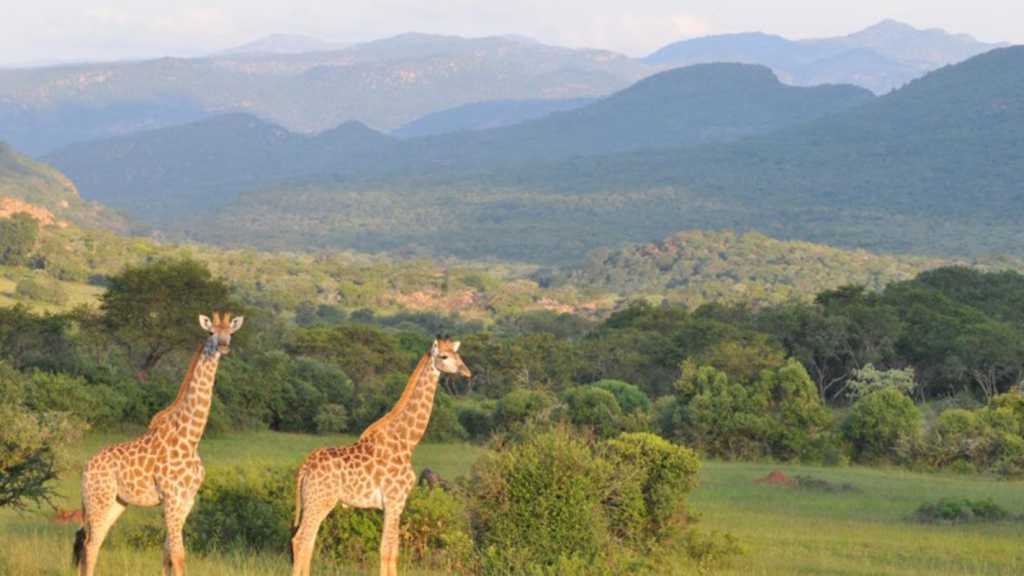Located in the Soutpansberg Mountains, the 2,600-hectare Leshiba Wilderness Reserve offers unparalleled scenery, unspoiled nature, diverse wildlife and many endemic species.
It is the sanctuary for giraffes, zebras, wildebeest, leopards, many antelopes and 250 species of birds. During your night safaris, you can see porcupines, pangolins, cape aardvark, brown hyenas, civet and genets.
The Soutpansberg Mountains are the only place in the country where you can find the five primates: the lesser bushbaby, the thick-tailed bushbaby, the Sykes' monkey (or samango), the vervet monkey and the Chakma baboon. Enjoy a sunset from the plains of Hamasha to enjoy a panorama that extends as far as the eye can see!
There are many activities on offer: hiking, horseback riding, cycling, safaris, bird watching, rock paintings, and star gazing.
This private reserve hosts the continent's best ecological lodges, with a focus on "sustainable development" and helping local communities including the Venda people.
The Venda people are from the Mapungubwe Kingdom, which stretched from the Soutpansberg Mountains to Zimbabwe’s Matopo’s Park. Their culture is based on a mythical belief system and finds its expression in wood carving, pottery and decoration of buildings. Water is a sacred element in their culture and Venda people honours the god of fertility Python, also controlling the rain, during ceremonies (Domba Python dance). Drums, ancestor worship and Sangoma (traditional healer) are also part of their culture. Traces of their culture can be found throughout northern Limpopo, Mapungubwe National Park, Leshiba Wilderness Reserve, Fundudzi sacred lake and Mashovhela Rock Pool.
Some Venda artists have managed to make themselves known worldwide.
The most northerly province of South Africa, it borders Mozambique, Zimbabwe and Botswana. Its name comes from the Limpopo River that runs along its northern border.
Limpopo is a destination rich in wild animals, spectacular landscapes and nature reserves. In addition to safaris and bird watching, the province is the cradle of ancient cultures, such as the Venda culture, steeped in myth and legend.
Advice:
- Makapan's Valley and "The Cave of Hearths" in Mokopane, a UNESCO World Heritage site
- Visit the Rhino Museum in Vaalwater, the only rhinoceros museum in Africa, devoted entirely to the conservation of this endangered animal
- The Magoebaskloof Spring Fair, in September, to visit gardens, discover orchids and wander amidst craft markets
- Mystic Monkeys Feathers Wildlife Park at Rust de Winter, near Bela-Bela
- Adventures with Elephants in Bela-Bela
South Africa, the 'rainbow' nation.
South Africa is so diverse you feel like you are visiting several countries in one trip!
With grandiose and various landscapes (mountains, « bush », beaches, forests, plains, desert), a pleasant climate in all seasons, an abundant and diversified fauna and flora including the “Big Five”, a population with the most composite ethnic groups, South Africa accumulates important natural wealth. Also note among its assets: quality of the hotel sector, services, road network, means of transport, rich and varied gastronomy, excellent wines, favourable exchange rates, 21 national parks and many private reserves, a multitude of activity throughout the country…
When to go?
South Africa has this peculiarity of presenting a wide variety of climates: Mediterranean, subtropical or temperate depending on the region with a high rate of sunshine everywhere (watch out for sunburn!)
South Africa can be visited all year round with more favourable periods depending on interests:
-
June, July and August (South African winter) for animals and therefore preferably the North of the country.
-
September and October: best times for flowers (Namaqualand) but very good for game drives as well.
-
From November to March (South African summer): best time to enjoy the South and East of the country, beaches of the Cape and the Indian Ocean. The Garden Route is particularly appreciated in February: the weather is nice; the temperature of the water is pleasant.
-
April and May: very pleasant autumn with always nice days in Cape Town and the resumption of the animal season.
Formalities:
The passport must include two blank pages and still be valid for 30 days after the expected date of exit from South Africa.
French nationals are exempted from prior visas. A 90-day residence permit will be issued at the border on entry into South African territory.
For other nationalities, inquire on a case-by-case basis with the competent authorities of their country of origin.
For any minor child: a multilingual extract of birth certificate (or an unabridged birth certificate translated into English - certified translation) is required to enter and leave South Africa (in the case of a child traveling with his 2 parents). Please consult the official sites for more information about all the requested documents according to your case.
Health:
No vaccinations are required for entry into South Africa. However, it is advisable to check the updating of your usual reminders and vaccinations as for any country.
Anti-malarial treatment is recommended (see your doctor).
Currency:
The Rand is the official currency of South Africa (symbol: ZAR). Credit cards are accepted everywhere and distributors are easily available for cash withdrawal. Travellers’ checks in euros are also accepted in banks and some hotels.
